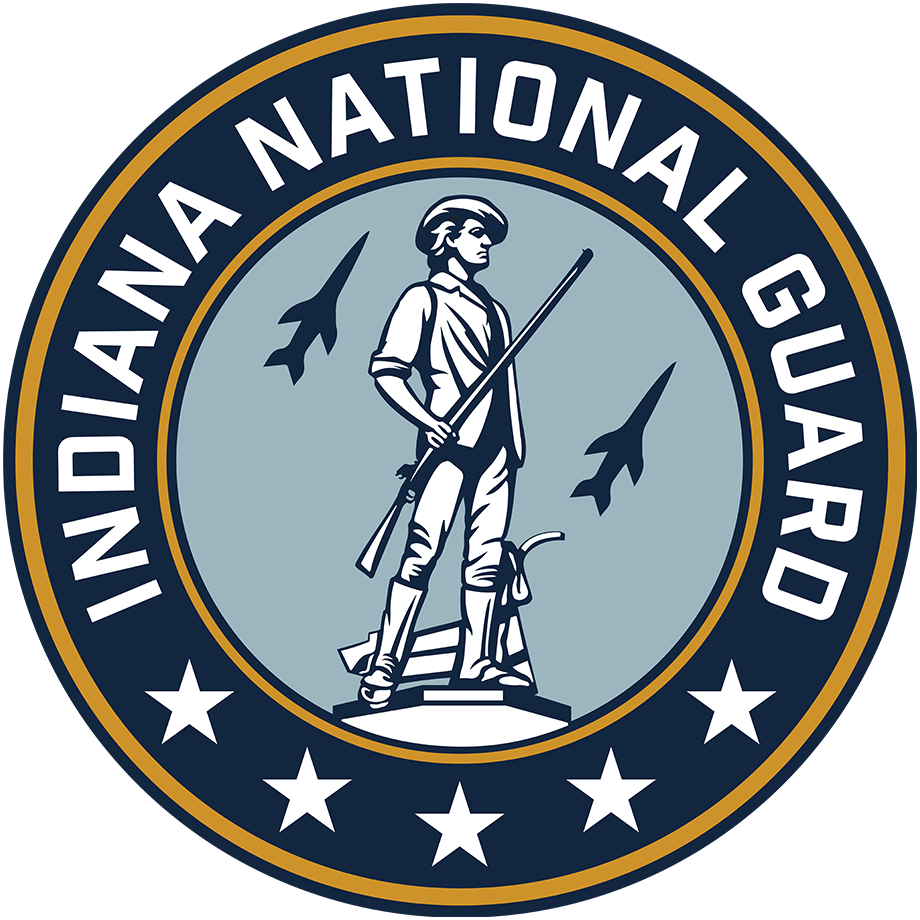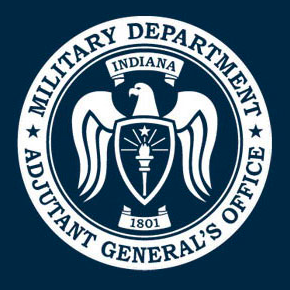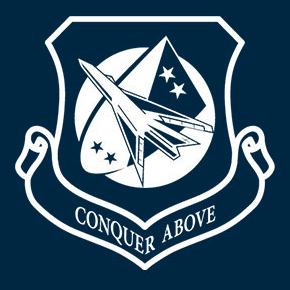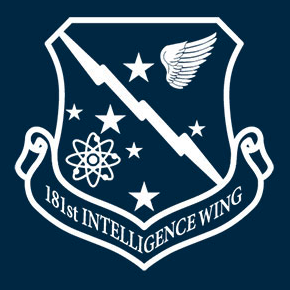Behavioral Health
*Mental readiness is just as important as physical readiness.*
THE VETERANS CRISIS LINE PROVIDES 24/7 CONFIDENTIAL CRISIS SUPPORT
FOR SERVICE MEMBERS AND THEIR LOVED ONES
If you or someone you know is currently experiencing thoughts of suicide, emotional distress or a mental health or substance use crisis, please CALL 988 + 1, TEXT 838255 or CHAT to speak with a trained crisis specialist 24/7. If your emergency situation requires immediate assistance from the police, fire department or ambulance/medical personnel, CALL 911.
Behavioral Health Resource Kit
- Increased isolation or feelings of loneliness
- Finding it more difficult to control feelings of nervousness or tension
- Increased drinking or drug use that is getting in the way of your relationships, work or school
- Increased difficulty falling or staying asleep
- Family or friends indicating that they are concerned about you
- Increased irritability and difficulty managing your anger
- Formal behavioral health assessment to help you identify what types of services you may need
- Assistance with locating behavioral health resources and providers in your community
- Case management services to act as a liaison between your civilian providers, your leadership and the INNG Medical Readiness team
- Command consultation services
- Specialty Evaluations (e.g., Sniper, Position of Significant Trust and Authority, Security Clearance, Medical Readiness)
- Wellness education
All services are confidential, with some exceptions:
- If you express intent to harm yourself or someone else, we need to keep you safe
- If your commander directed the evaluation, we need to disclose minimal information
- If you want us to coordinate with your civilian provider, we will ask for a release of information
Suicide & Crisis Lifeline
https://988lifeline.org/ Dial 988 (veterans, press 1)
24-hour, toll-free, confidential suicide prevention hotline available to anyone in suicidal crisis or emotional distress.
Crisis Text Line
TextSIGNSto741741
Crisis Text Line serves anyone, in any type of crisis, providing access to free, 24/7 support and information via text. A live, trained Crisis Counselor receives the text and responds quickly.
Vets4Warriorswww.vets4warriors.com 1-855-838-8255
Confidential personalized peer support by phone or chat 24 hours a day, 7 days a week. Open to active duty, National Guard and Reserve service members, veterans, retirees, and their families/caregivers.
Substance Abuse & Mental Health Services Administration (SAMHSA)
www.samhsa.gov/find-help/national-helpline 1-800-662-HELP (4357)
The helpline provides 24-hour free and confidential treatment referral and information about mental and/or substance use disorders, prevention, and recovery in English and Spanish.
The National Domestic Violence Hotline
www.thehotline.org 800-799-SAFE (7233)
With the help of our dedicated advocates and staff, we respond to calls 24/7, 365 days a year. We provide confidential, one-on-one support to each caller and chatter, offering crisis intervention, options for next steps and direct connection to sources for immediate safety.
National Call Center for Homeless Veterans
1-877-424-3838 and Press 1
If you are or know a Veteran who is homeless or at risk of becoming homeless, you may contact the National VA Call Center for Homeless Veterans. These resources are also available to Veterans’ family members and friends, VA medical centers, VA partners, community agencies, and service providers.
Additional Resources
Behavioral health care is support for your mental, emotional, and behavioral well-being—just like physical training keeps your body mission-ready, behavioral health keeps your mind and emotions in shape.
You don’t have to be in crisis to get help. Just like you'd treat a pulled muscle early, getting support early for stress or emotional issues can keep things from getting worse.
It includes help for:
- Stress, anxiety, or depression
- Sleep problems or anger issues
- PTSD or trauma from past experiences
- Alcohol or substance misuse
- Family or relationship struggles
Talk Therapy (Individual Counseling)
One-on-one sessions with a licensed therapist or counselor to work through challenges, learn coping skills, and build resilience.
Group Therapy
Therapist-led sessions with others facing similar challenges (like combat stress, substance use, or anger). It builds connection and support in a safe environment.
Medication Management
Sometimes, medication can help manage symptoms of depression, anxiety, or other mental health conditions. These are prescribed by a doctor or psychiatrist and monitored regularly.
Crisis Support
If you or a buddy are in immediate danger or having suicidal thoughts, crisis care is available 24/7 through calling 988, Veteran Affairs (VA), or local emergency departments.
Substance Use Treatment
Programs are available for those struggling with alcohol or drugs. This might include detox, therapy, and relapse prevention tools.
Contact Us
Indiana Army National Guard
J1 MED Behavioral Health
Camp Atterbury Bldg. 343
Hours of Operation: M-F 7:30 a.m. to 4 p.m.
Resource Line: 317-247-3155
Leave a message to consult with a Behavioral Health provider. Calls returned in one business day
Psychological Health Coordinator
Stout Field/Lawrence
317-741-5318
Psychological Health Coordinator
Camp Atterbury/Johnson County Armory
317-741-5298
Administrators
317-519-5759 | email
317-247-3300 X 73155 | email
Director of Psychological Health
Cell: 317-741-5132 | email
National Crisis Text Line
741-741
Indiana Air National Guard
Indiana Air National Guard Deputy Directors of Psychological Health
181st Intelligence Wing
812-877-5726
812-230-4505
122nd Fighter Wing
260-478-3733
Veterans Crisis Line
In an emergency, call the Veterans Crisis Line at 988+1 or text 988 to speak with a trained crisis specialist 24/7
Non-Emergency Resources
Indiana 211
Dial: 211 or 1 (866) 211-9966
Mon-Fri 7am-7pm ET
Text: Zip code to 898-211
Non-Emergency
Resource Line
317-474-5240
Full-Time Chaplain
317-508-2573
Soldier and Family Readiness Specialist
1-800-237-2850, Ext. 72694 or email
ng.in.inarng.mbx.indianasfrc@army.mil
Soldier and Family Readiness Center (SFRC)
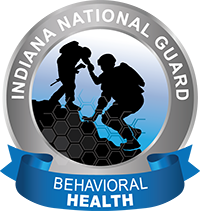
Indiana National Guard members and their families often face unique challenges managing the responsibilities of living and working in the civilian community while also maintaining their readiness to perform as a soldier or airman in the National Guard. The Behavioral Health Program of the Indiana National Guard is here to support Guardsmen and their families by helping locate Behavioral Health resources that are available in the communities where our members work and live. Although we do not provide treatment, the Behavioral Health Program staff will work with you and your civilian treatment team to make sure you get the help you need in order to maintain or improve your medical readiness, resiliency and effectiveness as a member of the Indiana National Guard.
Health Spotlight: Post-Traumatic Stress Disorder (PTSD)
PTSD is a mental health problem. It develops after going through a traumatic event. It is normal to have stress reactions to those type of life altering events. Most people start to feel better within a few weeks if symptoms last longer than 1-6 months and are causing problem in day-to-day life, it could be PTSD. Any one of any age can develop PTSD.
Common Causes of PTSD
Very intense or long-lasting traumatic event such as childhood abuse (sexual, mental, physical), combat, deployments, abusive relationships (sexual, mental, physical).
Any life-threatening event. Getting injured during an event can make developing PTSD more likely. What happens after a traumatic event also plays an important role: stress can make developing PTSD more likely; seeking care immediately after a traumatic event might make developing PTSD less likely.
Source: U.S. Department of Veterans Affairs National Center for PTSD
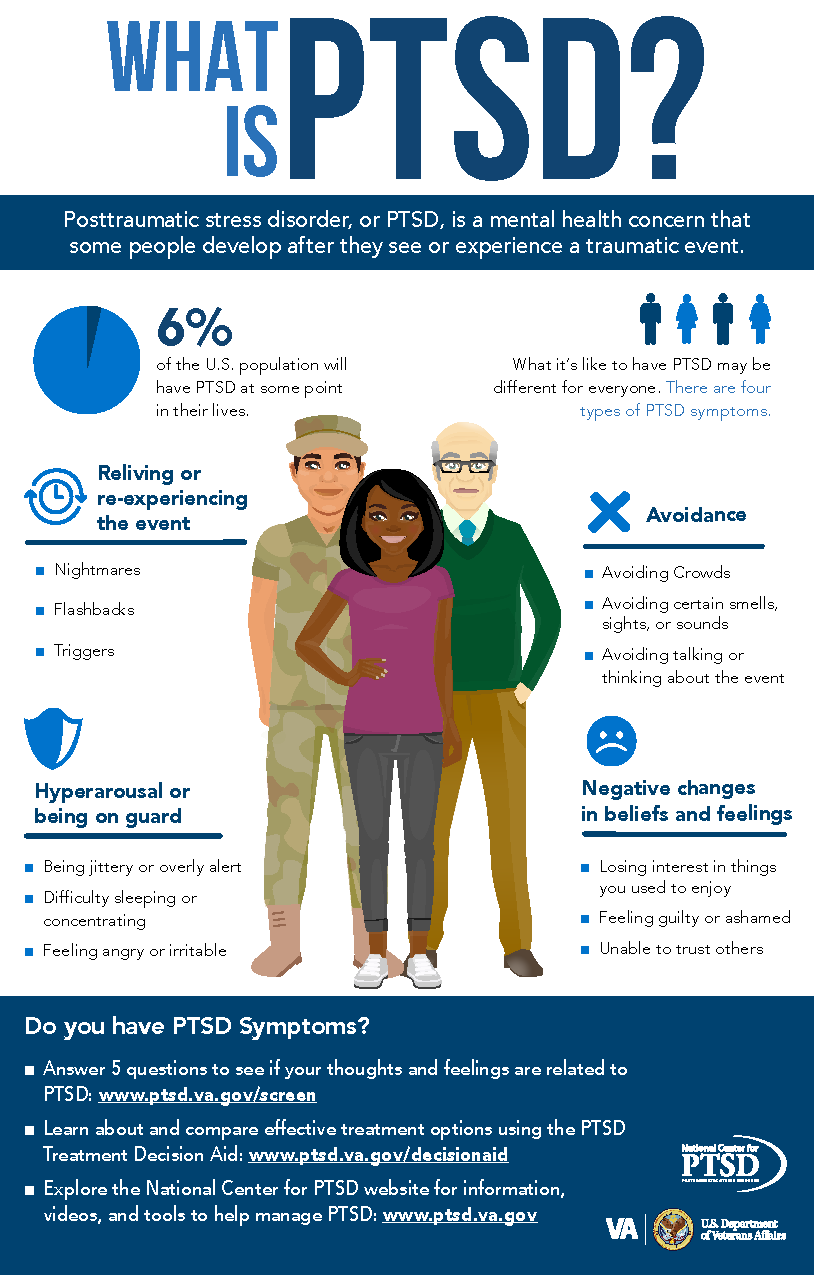
Symptoms of PTSD
Symptoms usually present soon after the event, but in some cases, they may not present until months, even years later. Also, symptoms may come and go over several years. If the symptoms last longer than 1-6 months and cause you great distress, interfere with work or home life, you may have PTSD.
DownloadTreatment Options
There are more options than ever for successful PTSD treatment:
- Talk therapy options such as cognitive processing therapy, prolonged exposure and eye movement desensitization and reprocessing (EMDR)
- Medication options to treat sadness, anger and other symptoms.
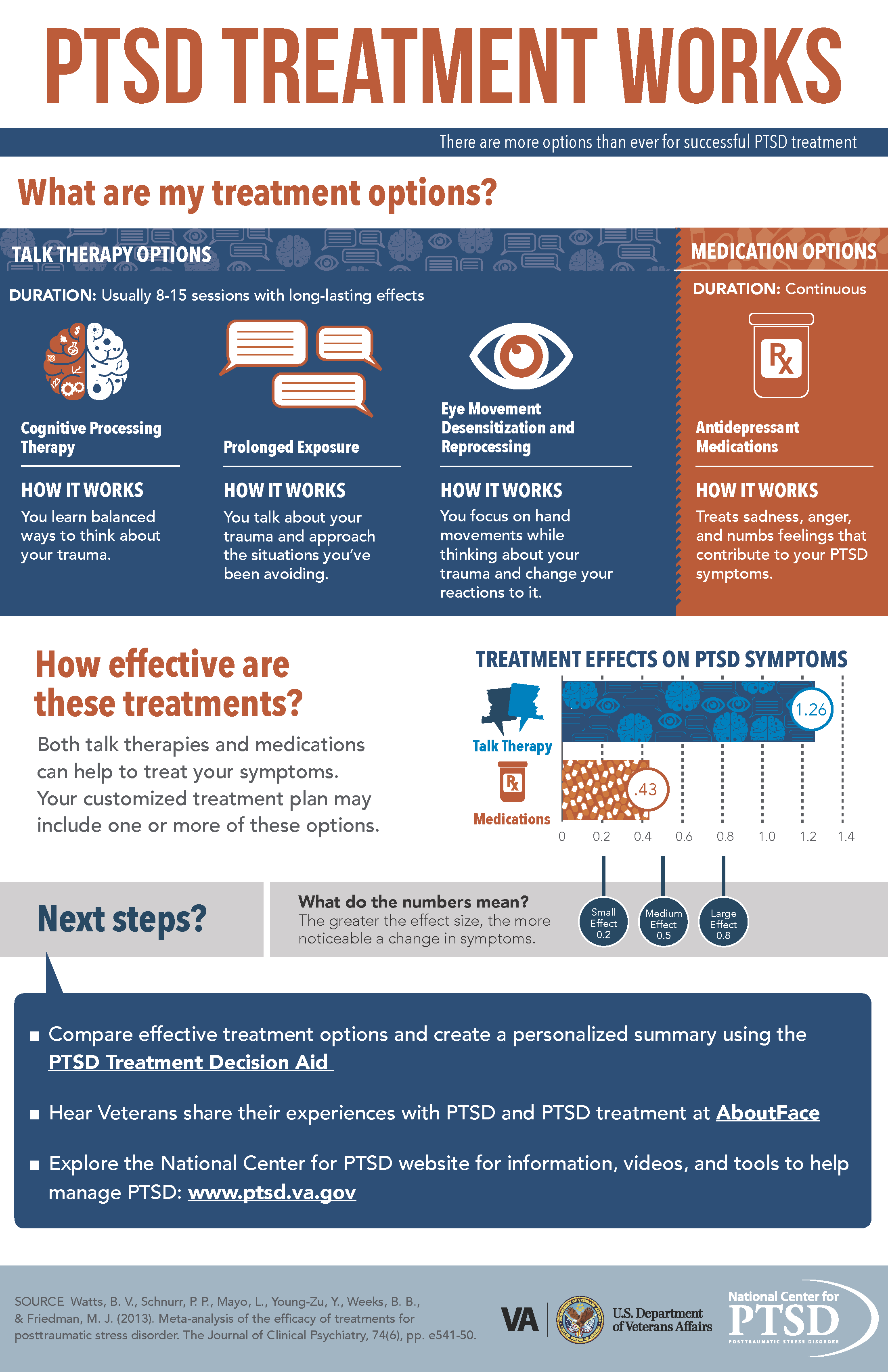
Military Department of Indiana | Indiana National Guard
